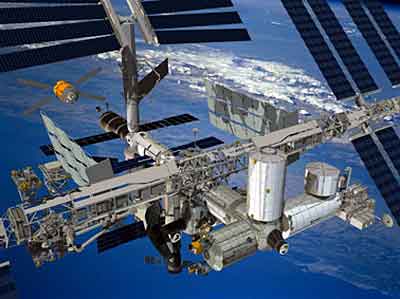ARISS contact is planned with the students of the IstitutoTecnicoIndustrile ‘Alessandro Rossi’, Vicenza, Veneto, Italy
The International Space Station (ARISS) Amateur Radio has received confirmation of the timing of an ARISS radio contact between astronauts aboard the International Space Station (ISS) and Italian students from the “Alessandro Rossi” Industrial Technical Institute , located in Vicenza, Veneto.
ARISS conducts 60 to 80 of these special amateur radio contacts each year between students around the world and licensed amateur radio crew members aboard the ISS.
The “Alessandro Rossi” Technical Institute of Vicenza is one of the oldest technical schools in Italy. It was founded in 1876 by senator and industrialist Alessandro Rossi, who wanted to import the model of German technical schools to Italy. Institute students (aged 14 to 19) can specialize in electrical engineering, computer science, telecommunications, mechanics or chemistry. Telecommunications students, supported by a company created by former students, built the antenna for this contact.
The institute collaborates with lower colleges (with students aged 11 to 14) to teach the introduction of robotics and artificial intelligence. Two of these schools have been invited to participate in this ARISS contact: the Integral Institute “Don Bosco”, in the municipality of Monticello Conte Otto, a few kilometers from the city of Vicenza, and the Integral Institute “Antonio Barolini”, in Vicenza. .
This will be a direct contact via amateur radio allowing students to ask their questions to astronaut Samantha Cristoforetti, amateur radio call sign IZØUDF. Local Covid-19 protocols are adhered to, where applicable, for each ARISS contact. The downlink frequency for this contact is 145.800 MHz and can be heard by listeners within the ISS footprint which also encompasses the relay ground station.
The amateur radio ground station for this contact is in Vicenza, Veneto, Italy. Radio amateurs will use the call sign I3IRV to establish and maintain the ISS connection.
ARISS radio contact is scheduled for June 14, 2022 at 12:08:55pm CEST (Vicenza, ITA)(10:08:55 UTC, 6:08 am EDT, 5:08am CDT, 4:08am MDT, 3:08 amPDT).
The public is invited to follow the live broadcast on: https://www.youtube.com/watch?v=-DeYw0Fi0xA
If time allows, students will ask these questions:
1. Guardandodaglioblo’ capita di vederesatellitiartificiali?
2. Guardandodall’alto la vastita’ e la bellezzadellospazio, ticommuovi da essereumano o tenuusiasmi da scienziato?
3. Il vostroaddestramento in astronauticavitornera’ useful per la vita quotidiana?
4. Sarestidispostaadarrivarefino a Marte?
5. Secondo te e grazie aituoistudi, sara’ maipossibileviveresu un altropianeta?
6. Era iltuosogno fin da bambina diventareun’astronauta?
7. Sulla ISS Il giorno e la nottesialternano come sulla Terra?
8. Riesci laughed assumed in his speech the sensazionicheprovivedendo la Terra dallospazio?
9. Qualieffettifisici e mentalisiriscontranounavoltaritornatisulla Terra?
10. Checosapensideiviaggicommercialinellospazio?
11. Hai maiavutodeimomenti in cui ha pensato di lasciarperdere la vita da astronauta? Se si, come haicambiato idea?
12. During the tuemissioni, qualisono state l’esperienzapiùemozionante e quelapiu’ deludentechehaivissuto?
13. Immaginocheilpercorso per arrival dove seisiastato molto lungo e ricco di ostacoli, come haitrovato la forza di superarli?
14. Chetipo di difficolta’ haidovutogestireduranteiltuopercorsoprofessionale?
15. Dalla ISS potetecomunicare con le vostrefamiglie?
Translation
1. Looking through the windows, do you see artificial satellites?
2. Looking at the vastness and beauty of space from above, are you moved as a human being or are you excited as a scientist?
3. Will your training in astronautics be useful to you on a daily basis?
4. Would you be willing to go to Mars?
5. According to you and thanks to your studies, will it be possible one day to live on another planet?
6. Was it your childhood dream to become an astronaut?
7. On the ISS, do day and night alternate like on Earth?
8. Can you sum up in three words the sensations you feel seeing the Earth from space?
9. What physical and mental effects are felt when returning to Earth?
10. What do you think of commercial space travel?
11. Have you ever had times when you thought about giving up your life as an astronaut? If so, how did you change your mind?
12. During your missions, what have been the most exciting and disappointing experiences you have had?
13. I imagine the road to get where you are was very long and full of obstacles, how did you find the strength to overcome them?
14. What kind of difficulties have you had to deal with during your professional career?
15. Can you communicate with your families from the ISS?
About ARISS:
Amateur radio on the International Space Station (ARISS) is a cooperative venture of international amateur radio societies and space agencies that support the International Space Station (ISS). In the United States, the sponsors are the Amateur Radio Satellite Corporation (AMSAT), the American Radio Relay League (ARRL), the ISS National Lab-Space Station Explorers, Amateur Radio Digital Communications (ARDC), and the Space communications and NASA navigation.
The main objective of ARISS is to promote the exploration of science, technology, engineering, arts and mathematics. ARISS does this by arranging scheduled contacts via amateur radio between crew members aboard the ISS and students. Before and during these radio contacts, students, educators, parents and communities participate in hands-on learning activities related to space, space technologies and amateur radio. For more information, see www.ariss.org .
Media Contact:
Dave Jordan, AA4KN
PR ARISS
Like us on facebook. Follow us on twitter. Research amateur radio on the ISS and @ARISS_status.
Check out ARISS on Youtube.com.


Comments are closed.